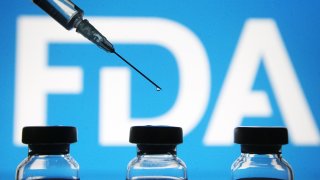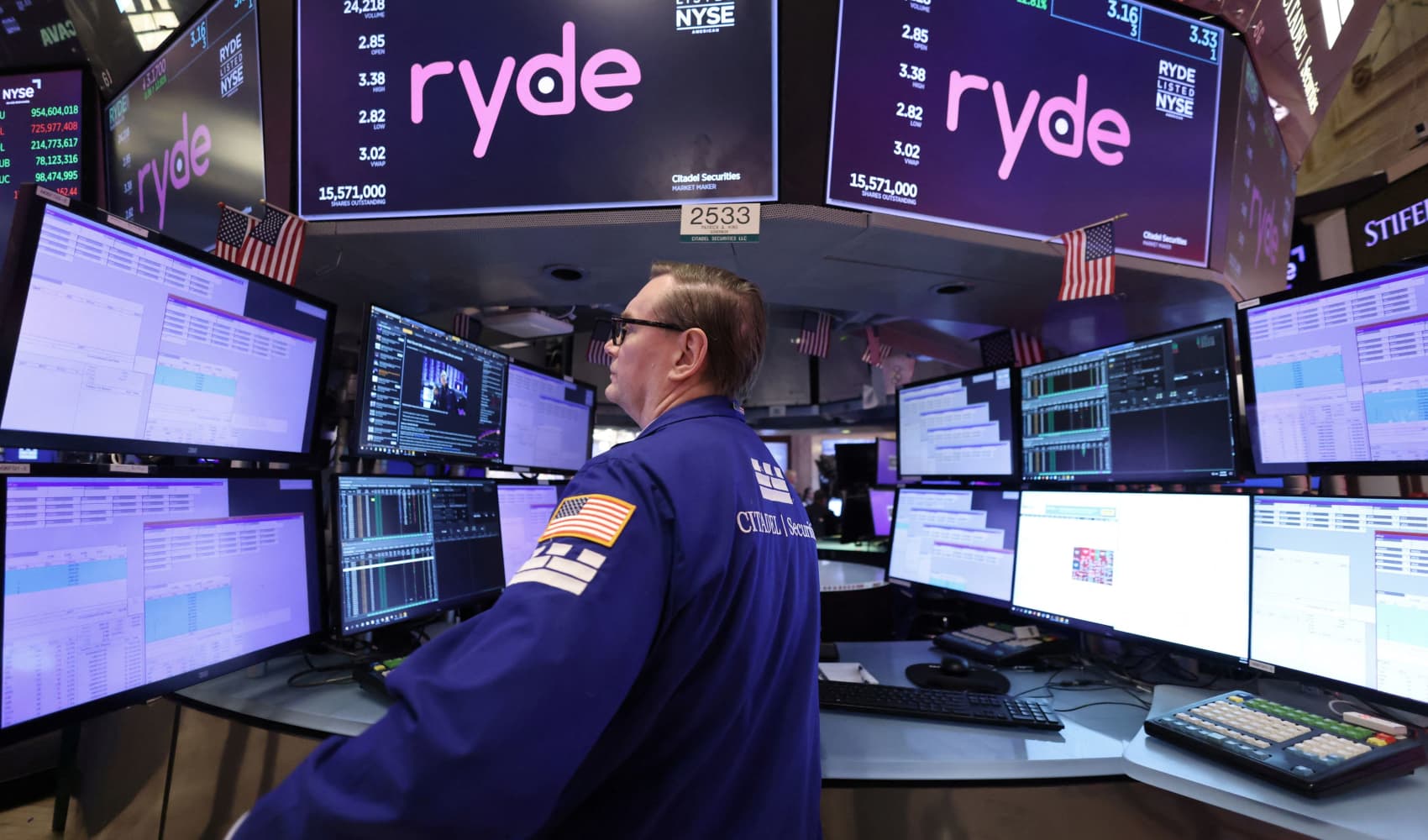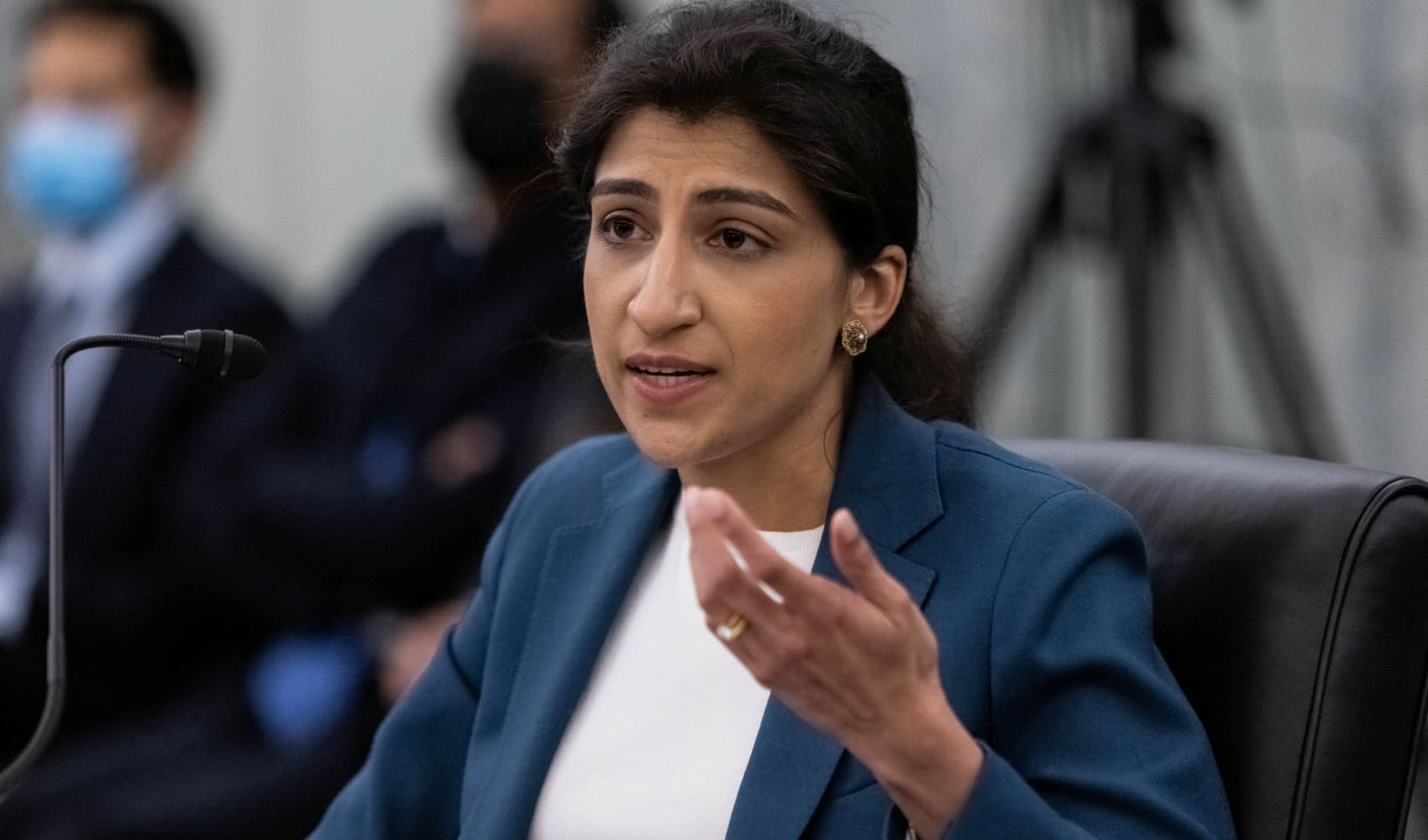
- U.S. approval of Pfizer or Moderna's vaccines can also have far-reaching impacts beyond the companies who submit the applications.
- Pfizer and BioNTech said May 7 they began the process of applying for their biologics license under expedited review.
- A day earlier, Moderna said in an earnings report it planned to begin the process of seeking full FDA approval sometime this month.
Pfizer and BioNTech have already started their application process for full U.S. approval of their Covid-19 vaccine. Rival Moderna is expected to submit for the same process for its shot later this month.
The mRNA vaccines are currently on the U.S. market under Emergency Use Authorizations, which were granted by the Food and Drug Administration in December. Since then, more than 263 million shots have been administered, according to data compiled by the Centers for Disease Control and Prevention.
Standard vaccine reviews generally take several months to a year or more to determine whether it is safe and effective for use in the general public. But due to the pandemic, which has killed nearly 600,000 Americans, the FDA permitted the use of the shots under an EUA.
Get Boston local news, weather forecasts, lifestyle and entertainment stories to your inbox. Sign up for NBC Boston’s newsletters.
In a public health emergency, the manufacturing and approval of vaccines can be streamlined through emergency authorizations. Former Health Secretary Alex Azar declared a public health emergency on Jan. 31, 2020. The health emergency has been renewed several times, most recently in late April. The FDA allowed the use of the shots with just two months of safety data under an EUA. It's not the same as a Biologic License Application, or a request for full approval, which requires at least six months of data.
"The way that works is the companies have to submit in this case for a vaccine, a Biologics License Application, and that goes through somewhat more review, obviously than an EUA would," acting FDA Commissioner Dr. Janet Woodcock said on SiriusXM on April 30. "And there are more manufacturing controls that are standard that are looked at and so forth."
Money Report
Full approval will be beneficial to the companies for multiple reasons, former FDA commissioner Dr. Robert Califf told CNBC. For one, it will allow the companies' vaccines to stay on the market once the pandemic is over and the U.S. is no longer considered in an "emergency," he said.
It also sets the stage for the companies to begin marketing the shots directly to consumers, he said. Companies can't promote their products under an EUA, he said.
"The vaccines will still have to be administered under the supervision of a professional who's qualified," added Califf, who was the agency's commissioner under the Obama administration beginning in early 2016. "It's not like they can send the vaccines to people's homes. However, they can advertise on TV and promote their products under the watchful eye of the FDA."
U.S. approval can also have far-reaching impacts beyond the companies who submit the applications, FDA advisors and health policy experts told CNBC.
It could encourage more businesses, universities and other organizations to start requiring people to get the shots, they said, an already controversial move that has impacted millions of students and employees across the U.S. It may also raise confidence in the vaccines and combat vaccine hesitancy, they said.
As 'expeditiously as possible'
The FDA approval process is likely to take months. There are multiple decisions along the way, including negotiations with the companies about what goes on the product label and how the companies can advertise the shots, Califf said.
White House chief medical advisor Dr. Anthony Fauci told CNN last month that U.S. regulators would work "as expeditiously as possible" once the companies submit their applications for full approval.
"When you're getting a formal approval you have to have a certain amount of time just observing predominantly the safety, and obviously the safety looks really, really good in well over 140 million people having been vaccinated with at least a single dose," he said. "I hope they do it quickly, because ... people when they hear it's still emergency use, they still have a little concern about how far you can go with it."
It is "highly likely" that the Pfizer-BioNTech and Moderna vaccines will be fully approved by the FDA as early as the second half of this year, said Lawrence Gostin, director of the World Health Organization's Collaborating Center on National and Global Health Law. The shots, he said, have already demonstrated to be safe and highly effective in millions of Americans.
"If the FDA doesn't approve them, it means there is something worrying about their safety or effectiveness," he said.
On April 1, Pfizer and BioNTech announced that new data from their clinical trial showed their two-dose vaccine was safe and more than 91% effective six months after the second dose. The companies said May 7 they began the process of applying for their biologics license.
Moderna is also inching closer to submitting its BLA application for use in adults. The company announced on April 13 that its vaccine was more than 90% effective at protecting against the virus six months after the second dose. And on May 6, the company said in an earnings report it planned to begin the process of seeking full FDA approval sometime this month.
Looking through data
Once the companies submit their application, FDA scientists will painstakingly look through the clinical trial data, including for any discrepancies or safety concerns, said Dr. Paul Offit, a voting member of the agency's Vaccines and Related Biological Products Advisory Committee.
It's a lot of data, added Offit, also a physician at Children's Hospital of Philadelphia. He previously said when Merck submitted its data from its 70,000-person rotavirus vaccine trial, the pages that were generated could have exceeded the height of the Sears Tower — a 1,450-foot skyscraper in Chicago that's now known as Willis Tower.
"The FDA will go through every single one of those case files," he said. "And then they will create their own 100-page to 120-page document that they then will submit to our FDA advisory committee to read through. They want to make sure that the company has fairly and accurately displayed all those data."
Dr. Archana Chatterjee, another voting member of the agency's Vaccines and Related Biological Products Advisory Committee, said she doesn't expect rare adverse events that may pop up in the data to be a big problem for the vaccines.
The FDA and CDC asked states to temporarily pause the use of another authorized vaccine, from Johnson & Johnson, in April after six women developed a blood clotting disorder. States resumed use of the vaccine 10 days later after a CDC advisory panel concluded the blood clots were very rare and the benefits of the shot outweighed its risks.
Finding rare adverse events post-clinical trials are common, Chatterjee told CNBC. "Sometimes you do find out that when the vaccines are deployed and given to millions of people that very rare adverse events that are associated with the vaccine may emerge that did not occur during clinical trials, even with tens of thousands of people," she added.
However, Offit said he can't think of any adverse events from a vaccine that didn't occur within six weeks of a dose. "There are 200 million doses or so shots that have been distributed so if it's going to cause a rare side effect, you would know that," he said.
Mandates
Dorit Reiss, a professor of law at UC Hastings College of Law, said there will likely be more vaccine mandates once the vaccines are fully approved. Employers and schools have few legal restrictions to require people to get vaccinated, she said.
"Traditionally, employers and universities have the right to mandate vaccines," she said.
Reiss said the emergency use authorizations of the vaccines made some groups nervous about mandating the shots, adding it raised some questions. The FDA had never granted an EUA for a vaccine for the entire population before and the standards for an EUA were seen by some as lower than for full approval, she said.
"I think we'll see more vaccine mandates once we have approval," she said.
Still, the rise in vaccine mandates post-approval may not be as prevalent as one might think, Reiss added.
"There still will be many places that will be hesitant," she said. "And we know that some states are considering prohibiting employer mandates or prohibiting businesses from requiring vaccines as evidence, which creates its own issues."
The groups that do mandate the vaccines will have to take into account people with disabilities or those who object to inoculations for religious reasons, Reiss said.
"There's the Americans with Disabilities Act, which applies to both employers and universities, and includes a medical reason not to be vaccinated," she said. "The other thing is for employers, under the Civil Rights Act of 1964, if an employee has a sincere religious objection to a workplace rule, the employer has to accommodate them, unless its an undue burden."
Winning approval
Once the vaccines are approved, the companies will likely aggressively market their shots and may change pricing, said Gostin, who is also a law professor at Georgetown Law.
Pfizer and Moderna say they expect to generate billions in sales from the Covid vaccines this year. Under pandemic pricing, Pfizer has charged the U.S. about $19.50 per dose. Moderna has previously charged the U.S. about $15 per dose. The companies have indicated they will hike the price of their vaccines once the pandemic wanes.
"We already see that with other vaccines such as for HPV and shingles," Gostin added. "But the vaccine wouldn't simply be bought by the consumer. Rather, it would be paid for by the consumer or through health insurance, and then administered by a doctor or nurse."
Approval could also raise confidence in the vaccine and combat vaccine hesitancy, health experts say.
In recent weeks, the pace of vaccinations in the U.S. has slowed as Americans who were eager to get the shots have already done so.
FDA approval could convince more "reasonable people," or about 70% of the population, that the shots are safe and effective, said Offit. The remaining 30% likely can't be convinced and have to be compelled through other means like employee perks, he said.
People think there is a difference in data quality between approval under emergency use authorization, but there really isn't, he said. "The only real difference is the length of follow-up for efficacy," he said.






